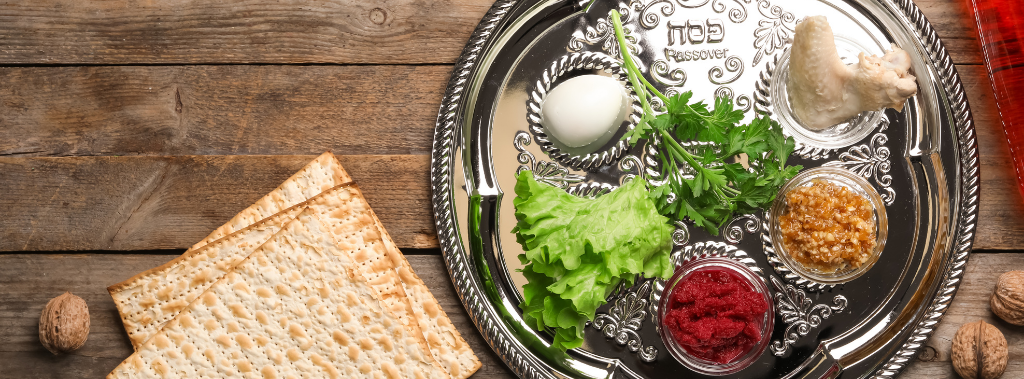Celebrating Passover as Believers
The history of the Christian faith is deeply rooted in Jewish heritage. There are abundant blessings in understanding and knowing our spiritual heritage as those who are grafted in through Christ (Romans 11:17). Yet often, there is hesitation among Believers to celebrate Passover, but there doesn’t need to be. Instead, celebrating Passover as Believers is an opportunity to connect with our heritage and draw closer to the Father.
Why has Passover been ignored by many in the Church? Find out here.
God uses beautiful imagery and symbolism to speak to His people. Through the Passover Seder, the God of order engages all our senses—touch, sound, sight, smell, and taste—in a specific way.
The Father wants every part of us to experience more of Him. To celebrate Passover as Believers means to accept the Father’s invitation to join Him at His table. This allows Him to release divine blessings upon us, setting our feet on His path for the year ahead.
Passover is an appointed time to ring in a new season. It is a time for us to…
- Take inventory of the past year.
- Assess how we have grown.
- Allow the Spirit to dig deep within and reveal areas that need more of His instruction.
- Leave behind the areas He pruned away in the last season.
- Remember the freedom we have through the blood of Jesus.
Celebrating Passover as Believers reminds us that we are restored to the Father through the Son—that we get to come to His table, receive the Spirit’s instruction, and walk in the fullness of our salvation for the year ahead.
Have You Felt Distanced from the Lord Lately?
When we grow closer to the Lord and accept His invitation to meet with Him during Passover, the Spirit’s presence and voice become clear, adding confidence and victory to our daily walk. In the past year, if you have felt that there were times you wandered in the desert, you can be certain God does not waste those moments. He promises never to leave you during these struggles, desiring to shape you to be more like Him.
Those times were opportunities to draw nearer to Him. And Passover is when a revelation is released so you can leave behind the past and embrace the new healing, protection, and prosperity He has for you.
The Lord is restructuring your life so that you can rest in Him.
God works in a cycle: He releases, restructures, restores, and gives rest. When we abide in His presence, we better understand this cycle and can align with His plans.
Then, when we feel distanced from Him or experience adversity and challenges, we can expect that our breakthrough is on the other side. This gives you hope to praise Him before, during, and after your breakthrough.
Celebrating Passover as Believers | Understanding the Seder
Seder means ‘order’ in Hebrew. God does not operate out of confusion but out of peace and order (1 Corinthians 14:33).
God uses the Passover Seder to reveal His character of order and peace. The Seder brings us through the door and into the next season. This is when we must decide what we are taking through the door and what we are leaving behind in the desert.
In Egypt, before God’s people were free from slavery, God purified them, allowing them to take refuge in Him or release them back into their bondage of sin. Those who chose sin—chose death. He warns that death will surely come if we are outside the door, but if we take refuge inside, covered by the Lamb’s blood, He is our help and shield.

Entering in with Clean Hands
“Who may ascend to the mountain of the LORD?… The one who has clean hands…”
—Psalm 24:3-4 (NIV)
The instruction concerning those who enter into God’s presence symbolizes that we must have guiltless actions. The Spirit of God living inside of us keeps us in Christ Jesus so that we are free from all blame (see 1 Corinthians 1:8).
We begin the Seder by washing our hands. This symbolic act shows that we are willing to start the new season fresh, surrendering ourselves to the Lord and allowing His Spirit to wash over us. This gives us a fresh look at His grace and sacrifice.
Blasting the Shofar
“With trumpets and the sound of a horn, shout joyfully before the Lord, the King.”
—Psalm 98:6
The shofar blasts as we gather. The blasts symbolize leaving the past behind. Press into the new season with clean hands, and ask the Lord to use you in fresh, new ways—renewing and awakening a right Spirit within.
Lighting the Candles
“Your word is a lamp to my feet and a light to my path.”
—Psalm 119:105
As we progress through the Seder, we begin to understand more of how the lighting of the candles symbolizes revelation. It is a revealing of Yeshua—a revealing of who He really is. With the revelation of truth comes wisdom, knowledge, and understanding.
The light shows us just how much we truly need God’s grace. When we are not walking with God, we are lost and wandering. God desires for us to choose His Light for our path so that our paths will remain straight (Hebrews 12:13, Isaiah 42:16).
Breaking the Hold of Sin
“And you know that Jesus came to take away our sins, and there is no sin in Him.”
—1 John 3:5 (NLT)
“Then Jesus declared, ‘I am the bread of life…’”
—John 6:35 (NIV)
The matzah is the unleavened bread, eaten and broken during the Seder. The Bible uses leaven, or yeast, to represent evil and sin. The three pieces of matzah are used to represent how the Triune God is completely pure and has no evil in Him.
The middle piece of matzah is broken, removed for a time, and is blessed. This represents Yeshua—Jesus—our Messiah.
Jesus is sacrificed and broken on the cross, and then resurrected on the third day. It is by unmerited favor that He came to us. While we were still sinners, He died for us and was raised to life on the third day. Therefore, we can have hope in who God says He is.
Drinking the Wine
“Go, eat your bread with joy, and drink your wine with a merry heart; for God has already accepted your works.”
—Ecclesiastes 9:7
The four cups of wine are sipped at specific times throughout the Seder. The four cups are: sanctification, plagues, redemption, and praise. Our walk with God is a process. These four cups represent the process God uses to bring us deeper into His presence as He fills us with joy and praise.
We cannot journey to redemption without first being sanctified.
God’s plan of redemption involves sanctification, the removal of sin. The first cup is a revelation that we need to be cleansed from our sickness and sin. When we accept Christ and His work on the cross, our sin is expunged.
The plagues teach us that God is more powerful than anything we, and the people of Israel, could ever put our trust in.
In the cup of redemption, we are brought to the blood of Yeshua—Jesus. With this cup, after the realization and revelation of our need for a Savior, we are sealed to Him because of God’s promises.
The fourth cup is the revelation of giving praise through our trials. We have glad hearts for every step God takes us through. We know that in every bend and every way, His Word sharpens us. We can truly rejoice in knowing that we have inherited the Promised Land through our salvation in Yeshua.
With our cups full to the brim, God’s love spills over, and we cannot help but love and praise our LORD!
Praising God for New Beginnings
This night of Passover is different when we come to God ready for revelation… ready to see Yeshua as the Light of the world. When we understand our heritage and that we have been redeemed, we are free. Free of sin, and free to praise God.
Yet, we cannot enter the Promised Land without first wandering in the desert. When we are ready to go into a new season, we must first be purified and stripped of sin.
Allowing Him to cleanse us can be a scary thought. Sometimes we tend to be like the Israelites in the desert when they said, “Let’s go back to Egypt… we had food there, it was better there, even in slavery!” The problem is that we start to see our sin through our perspective and not God’s. We see it working for us in the short term. We justify our actions because it seems too much to allow God to take over and cleanse the filth away.

However, when we leap of faith, we land in the Promised Land. Our cup truly runs over. We give uninhibited praise to the God of the universe because we believe He is faithful to redeem and conquer. And we begin to experience His victory for ourselves.
Celebrate Passover as Believers with Us!
Passover is one of the most important spiritual seasons. Join us HERE on Friday, April 7th 6:15 PM CT.
